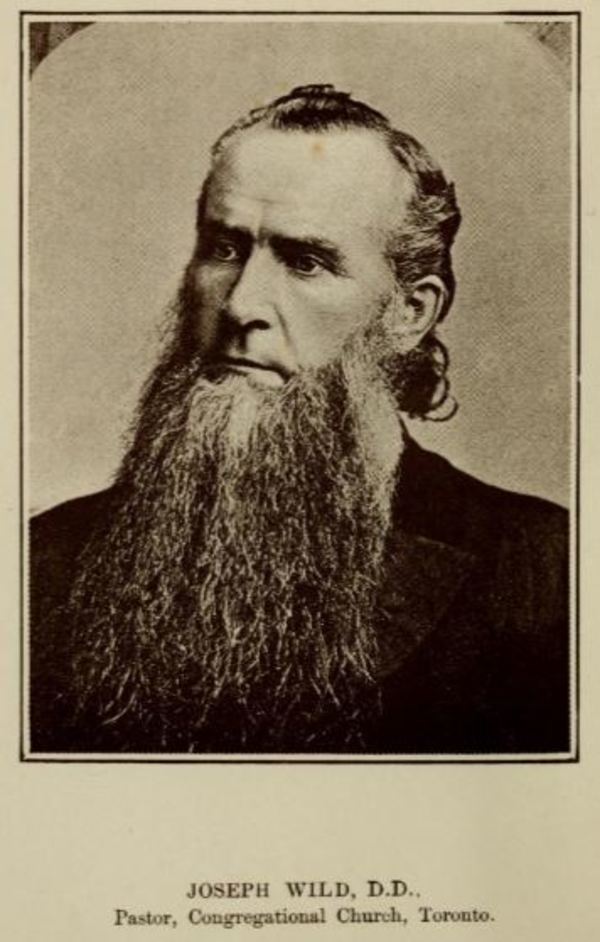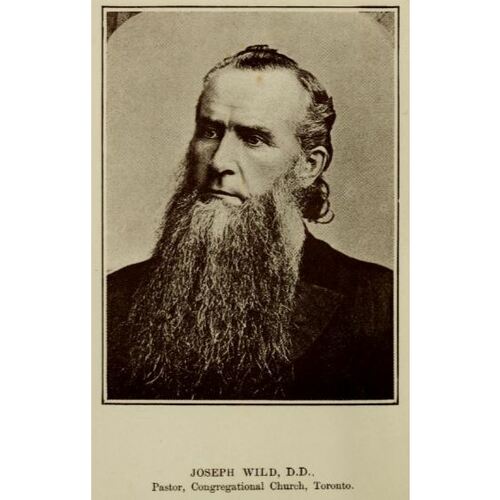
Source: Link
WILD, JOSEPH, Methodist and Congregational preacher, British Israelite, and author; b. 16 Nov. 1834 in Summit, near Littleborough, Lancashire, England, son of Joseph Wild and Rachel Kershaw; m. 15 Aug. 1859 Mary Victoria Hixon, daughter of a wealthy landowner from Bronte (Oakville), Upper Canada, and they had one daughter and two sons; d. 18 Aug. 1908 in Brooklyn (New York City).
All that is known of the early history of Joseph Wild is what he told those who showed interest in his past when he became an eminent public figure as the spectacularly successful pastor of Bond Street Congregational Church in Toronto in the 1880s. His father, a weaver, preached for the Primitive Methodists, and young Joseph, apprenticed to a civil engineer, was himself licensed to preach among the Primitive Methodists at age 16. In 1855 he emigrated to the United States where he looked in vain for a career. Late in 1857 he became pastor of the Methodist Episcopal Church in Hamilton, Upper Canada. Immediately after his marriage, he received support from a member of his congregation to study for two years in the United States, perhaps at the Boston Theological Institute in Cambridge, Mass., or at a biblical institute in Concord, N.H. He subsequently spent an unhappy year ministering to impoverished Methodist churches in the vicinity of Goderich, Upper Canada, and then a year in Europe.
In 1862 Wild returned to Upper Canada to a Methodist church in Orono, and in 1864 he became pastor of the Methodist church in Belleville. He also took on the posts of treasurer and professor of oriental languages at the Belleville Seminary (renamed Albert College in 1866). His years in Belleville seem to have been modestly successful, and they coincide with the award of an honorary am from Genesee College in Lima, N.Y., in 1867 and an honorary dd from Ohio Wesleyan University in Delaware, Ohio. Wild later claimed that he had been a particularly efficient financial manager at Albert College, but Albert Carman* was to embarrass him in 1878 with the discovery of a serious discrepancy in the books dating from his time as treasurer.
Wild moved to Brooklyn in 1872 and became pastor of the Seventh Avenue Methodist Church. Pressed to move after three years by the Methodist itinerancy rule, he accepted instead a call to the pastorate of Elm Place Congregational Church just around the corner. There, hard by the churches of two great American preachers, Henry Ward Beecher and Thomas De Witt Talmage, Wild’s career began to soar. The key to his new success in the pulpit was his discovery of British Israelism, a sectarian movement that took as its foundation work John Wilson’s Lectures on ancient Israel, and the Israelitish origin of the modern nations of Europe (Cheltenham, Eng., 1840). In the 1870s the principal doctrines of the British Israelites were defined and widely published by Edward Hine in his Seventeen identifications of the English nation with the lost house of Israel (London, 1870), and by Edward Wheler Bird, using the pseudonym Philo-Israel, in his monthly Banner of Israel, published in London from 1877. Drawing on these and other publicists of British-Israelite prophecy, Wild found that the identification of British imperial power, stretched to include the United States, with the lost tribes of Israel provided him with a theme that packed his pews. Anglo-Saxon superiority, the moral and political pre-eminence of the white, Protestant, English-speaking world, became the principal message that made him a shining star in Brooklyn.
That same good news, coupled with his technically polished performances in the pulpit, enabled Wild to become an even brighter star in Toronto after he accepted a call to Bond Street Congregational Church in 1880. There, as an evangelist for the glories of the British empire and its prophetic destiny in the civilization and salvation of the world, he regularly drew crowds of 3,000 people on Sunday evenings. Journalist John Ross Robertson*, who was fascinated with Wild, reported that the congregation cheered and burst into applause when the preacher, inspired by “some patriotic fire that burns within him,” rose to a plane of dramatic fervour. With Bond Street as his base, Wild also took his show on the road and preached his blend of prophecy and imperialism throughout Ontario. He further broadcast his views in weekly contributions to the Canadian Advance in Toronto and by issuing numerous collections of his sermons. He was chairman of the Congregational Union of Ontario and Quebec for 1889–90. When the Toronto Daily Mail organized a poll of its readers in 1891 to determine who was the most popular preacher in Ontario, Wild came out on top.
One of the themes that Wild had developed while still in Brooklyn was an elaborate justification of the English language as the best and purest the world had to offer. In Canada he joined his patriotic and religious commitment to English with his detestation of Roman Catholicism and Catholic Ireland. He became an intensely energetic supporter of the Orange order and an enemy of French Quebec. From 1887 to 1890 he went on an anti-Catholic rampage. Spurred on by the agitation over the Jesuits’ Estates Act [see D’Alton McCarthy*], he threw himself wholeheartedly into a battle that made him a national figure. There is some evidence, however, that his extreme attack on Catholicism caused him to lose support among the regular members of the Bond Street congregation.
No evidence survives to explain the catastrophe which overtook Wild in 1893. On 28 June, for reasons that he and the deacons at Bond Street succeeded in suppressing, he was forced to resign his pastorate. It was rumoured that he was in financial trouble at the time. He subsequently served for a few months at First Congregational Church in London, and after that he disappeared into private obscurity. At the end of the decade he tried for a comeback in Toronto, where he rented Massey Music Hall for a season and then the Majestic Theatre. He died in Brooklyn on 18 Aug. 1908, and, with his masonic funeral, his final success, he once again filled the Bond Street church.
Joseph Wild’s published sermons include How and when the world will end (New York, 1879); The lost ten tribes: and 1882 (New York, 1879); The future of Israel and Judah; being the discourses on the lost tribes . . . (London, 1880); Seven sermons delivered in Bond Street Congregational Church, Toronto, Ont. ([Toronto?, 1881?]); The Bond Street pulpit; being a series of discourses (Toronto, 1888); Canada and the Jesuits; being a series of six sermons (Toronto, [1889]); Dr. Wild’s Sunday evening sermons (Toronto, [1891?]); and Talks for the times (Toronto, 1896). He is also the author of a book of hymns, Songs of the sanctuary (London, 1886), and The origin and secrets of freemasonry; being a lecture . . . (Toronto, [1889?]).
AO, RG 8, I-6-B, 17: f.18. Lancashire Record Office (Preston, Eng.), Littleborough Wesleyan Methodist Church, reg. of births and baptisms, 1805–37 (mfm.). UCC-C, 3022; Church records, Toronto Conference, Bond Street Congregational/United Church (Toronto), records. Evening Telegram (Toronto), 19 Aug. 1908. Globe, 20 Aug. 1908. New York Times, 21 Aug. 1908. Toronto Daily Star, 19 Aug. 1908. Banner of Israel (London), 32 (1908): 407 et seq. “The Congregational churches of Canada: a statistical and historical summary,” comp. Douglas Walkington (mimeograph, [Toronto], 1979; copy at UCC-C). Cyclopædia of Canadian biog. (Rose and Charlesworth), vol.2. Robertson’s landmarks of Toronto, 4: 479. G. J. Stortz, “Dr. Joseph Wild: nineteenth-century Protestant spokesman,” UCC, Committee on Arch. and Hist., Bull. (Toronto), no.29 (1980–82): 18–32. John Wilson, “British Israelism: the ideological restraints on sect organisation,” Patterns of sectarianism: organisation and ideology in social and religious movements, ed. B. R. Wilson (London, 1967), 345–76.
Cite This Article
R. J. Helmstadter, “WILD, JOSEPH,” in Dictionary of Canadian Biography, vol. 13, University of Toronto/Université Laval, 2003–, accessed December 30, 2025, https://www.biographi.ca/en/bio/wild_joseph_13E.html.
The citation above shows the format for footnotes and endnotes according to the Chicago manual of style (16th edition). Information to be used in other citation formats:
| Permalink: | https://www.biographi.ca/en/bio/wild_joseph_13E.html |
| Author of Article: | R. J. Helmstadter |
| Title of Article: | WILD, JOSEPH |
| Publication Name: | Dictionary of Canadian Biography, vol. 13 |
| Publisher: | University of Toronto/Université Laval |
| Year of publication: | 1994 |
| Year of revision: | 1994 |
| Access Date: | December 30, 2025 |



